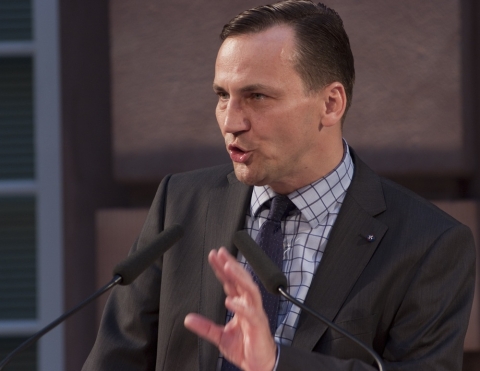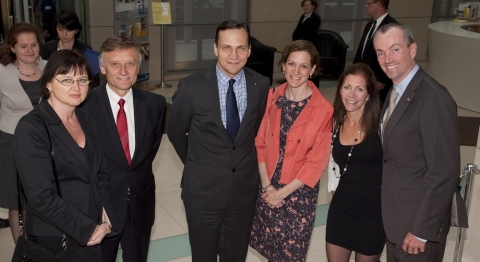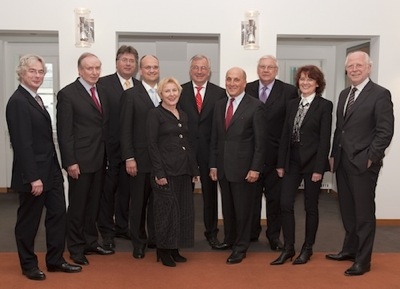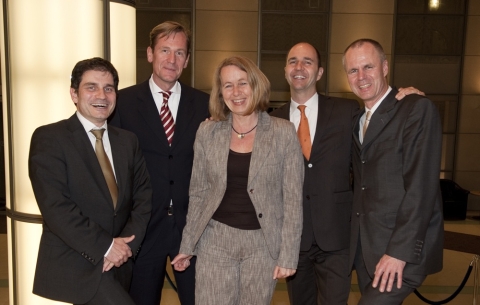
Poland's Foreign Minister Sikorski during his speech

From left: Polish Ambassador to Germany and Mrs. Marek Prawda, Foreign Minister Radoslaw Sikorski and his wife Anne Applebaum, and U.S. Ambassador to Germany and Mrs. Philip Murphy, patron of the Burns Fellowship

Members of the new German board of trustees at the Berlin dinner

Burns alumni from the first class in 1988. From left: Klemens Semtner, Mathias Döpfner, Ulrike Plewnia, Björn Boer and Stefan Maier
German Burns class of 2010 (nine of the ten)
More than 150 Burns alumni, board members and guests gathered in Berlin on an unseasonably chilly June evening to hear from two Central European foreign ministers on topics as varied as transatlantic relations and the future of foreign correspondents.
The event, held at the headquarters of Deutsche Bank on Berlin’s Unter den Linden boulevard, was co-hosted by the German Foreign Ministry. Foreign Minister Guido Westerwelle began the evening by welcoming his Polish counterpart and guests from the United States and Germany with a speech in English about the importance of cultural exchanges like the Burns Fellowship.
Westerwelle recounted an early visit to the United States as part of a government-sponsored tour of the country that took him to spots off the typical tourist itinerary, like Tallahassee, Florida, and Springfield, Ohio. “When we look to international relations, we always think of government officials and official meetings,” Westerwelle told the audience. “But this is not what counts—what counts is a close network between the people of our two countries.”
Westerwelle’s Polish counterpart Radoslaw Sikorski is a key player in Germany’s efforts to build better relations with its eastern neighbors. Sikorski was the keynote speaker at the banquet, and the Oxford-educated foreign minister took the opportunity to give a pointed address on the importance—and precarious state of—the media.
Unusual for a top government minister, Sikorski can speak from first-hand experience about the journalism profession. Named Poland’s foreign minister in 2007, Sikorski spent decades outside of his native land. He emigrated from communist-ruled Poland to the United Kingdom when martial law was declared in 1981. After earning a degree at Oxford, Sikorski traveled to Soviet-occupied Afghanistan, where he began his career reporting on the mujaheddin resistance for British magazines like The Spectator. “For me, journalism was a political cause,” Sikorski said. “At that time, the Afghans were fighting [Poland’s] fight.”
In his speech, Sikorski recalled sending dispatches to London by donkey from the front lines at Afghan hot spots like Tora Bora, contrasting the three to four-week lag for war reporters with today’s instant communications and relentless deadline pressure.
From a first-hand perspective, he lamented the decline of foreign reporting. He recalled the role that foreign correspondents played in communist Poland as crucial, acting as the voice for Poles who couldn’t ask tough questions themselves. “In retrospect, this was a golden age of foreign correspondents,” he said. “We are now living in the twilight of foreign correspondents.”
Sikorski said that the decline of major media outlets in the United States and Europe was a threat to civil society—and international relations. “The voter who wants to find out what’s happening in the country next door will now have to make a real effort, because that news is no longer in their morning newspaper,” he said.
German journalists at the dinner later pressed the foreign minister for an evaluation of Polish-German relations, which have been tense in recent years. Sikorski said that since Poland’s membership in the European Union, its economic successes over the past decade and a new government in Warsaw, things had dramatically improved. “Poland is no longer fearing Germany, and Germany is respecting Poland’s success,” he said. “I hope Poland is seen in Germany not as an East European country, but as a northern European country.”
Sikorski was the second prominent Pole to address the annual Burns alumni gathering in three years, following former Polish President Aleksander Kwasniewski’s speech in 2008. “It’s an interesting contrast between the post-communist Poland represented by Kwasniewski and the new, young European generation that Sikorski stands for,” said Frank-Dieter Freiling. “It’s clear that this is a growing part of Europe at its best.”
Andrew Curry is a freelance journalist living in Berlin. His work has appeared in Archaeology, The Christian Science Monitor, Foreign Policy, National Geographic, Spiegel Online International, The Washington Post, and Wired, among many others. Previously he worked for Smithsonian and U.S. News and World Report. He spent his fellowship in 2003 at Welt am Sonntag, and was a 2008 Burns award winner. His website is www.andrewcurry.com.